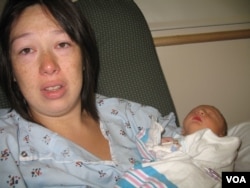When I came to the U.S. as a graduate student at Ohio University, my life on campus was full of things that were exciting, surprising and just plain weird.
On top of the weird list, I would place the attitude that many students held toward sleep.
It appeared that folks were proud that they needed very little sleep to go through the day. Sleepless nights were something to admire. Surely there are plenty of sleep-deprived people in Ukraine, but I never heard them bragging about it.
Many U.S. students seemed to believe that the best time to prepare for a test or write a paper was the night before it was due. While some Ukrainian students do the same – many combine studies with a full-time job like I did – they don`t suffer the same consequences.
Most establishments of higher education in my native country have a semester system: Students take most exams and submit papers twice a year at the end of each semester. Basically, you have to survive an extremely heavy load of study and sleep deprivation for a limited time only.
In U.S. schools, work is spread evenly throughout the whole year with only a modest uptick at the end of a quarter or a semester. I liked that a lot, precisely because that never created a need to forego a night of sleep for studies.
However, for many students, it meant they were sleep-deprived the whole year, for studies and partying, alike.
I could see the consequences.
In reading groups, students struggled to keep their eyes open. Young men and women slept in the most surprising places around campus: the library, cafeterias, class and even the gym.
Life outside campus was not much different.
The most surprising to me was sleep-deprivation in the medical profession – among the people who should be the most knowledgeable of its consequences! Doctors, nurses and especially residents worked as much as 100 hours a week which sometimes meant that shifts lasted longer than 30 hours.
The same attitude was prevalent in the financial and business world. Investor bankers and stock brokers famously work 90-hour-long weeks.
Yahoo chief executive Marissa Mayer said in a Bloomberg interview that at Google she worked all night at least once a week. She ensured that it is totally possible to work 130-hour-long weeks if “you are strategic about when you sleep, when you shower, and how often you go the bathroom.”
The attitude that sleep is some sort of necessary evil is widespread in the U.S. In a monthly parenting advice leaflet handed out at the daycare where my son used to go parents were advised to sleep less to be able to manage more, with step-by-step instructions on how to cut an hour or two of their shut-eye time.
According to a 2013 Gallop Study, 14 percent of Americans slept less than five hours a night. Twenty six percent slept six hours, and percent followed doctors` recommendations of seven and more hours between the sheets.
Those numbers have remained stable for the past 20 to 25 years. At the same time, 1 in 3 people in the US has at least mild insomnia.
Lack of sleep affects the so called “executive function” of the brain the most. This is the ability to think through your actions, execute them according to the plan, anticipate consequences, and achieve intended results, “NutureShock: New Thinking about Children” authors write.
The ability to concentrate and maintain focus suffers as well. In one study, researchers tested cognitive abilities of people who slept four, six and eight hours. It turned out that the cognitive abilities of the sleep-deprived group (both who slept 4 and 6 hours) were diminishing daily till they stabilized at a low level.
Both these and other studies demonstrated that people who lack sleep often don`t realize how much their cognitive abilities and well-being are affected. Forgetfulness? Irritability? Professional degradation?
Well, what would you expect? We are getting older and life is hard, they say. In reality, instead of getting used to the lack of sleep, people adjust to their lower level of health and efficiency, accumulating sleep deficit.
In other words, we begin to hold ourselves to the lower standards of performance when going through a prolonged period of sleep-deprivation.
That never happens to me or someone I know, you might say. Yes, I also know a person who sleeps 4-5 hours a night and is an excellent performer in all areas of life. Some lucky people on this planet have so called “healthy insomnia”. They can live on a few hours of sleep without any negative consequences.
One woman was known to sleep about an hour every night. And former President Bill Clinton was famous for sleeping just five to six hours each night.
Unfortunately, it is all in our genes and there is no way to purposefully develop healthy insomnia – only an unhealthy one. So, please, don`t let others blackmail you into sleeping less by touting examples of Napoleon, Michelangelo, Margaret Thatcher, and other “genetic mutants.”
According to studies, sleep also strengthens the immune system. When we sleep our cells are renewed and repaired. This slows down aging and improves looks. I am sure every woman has done this experiment on herself, hiding its results under heavy layers of foundation.
During sleep, your emotional state is being “rebooted.” Negative emotions and recollections are stored in the amygdala and positive ones in the part of the brain called hypothalamus, which is more than amygdala affected by the lack of sleep, according to Po Bronson and Ashley Merryman. A person who doesn`t have enough sleep is like an iguana: Whatever good you do to her, she never remembers!
I have a theory that the low status women experience in most societies since the Dawn of Agrarian Civilization can be explained by sleep-deprivation during child-rearing. They have been thought as less intelligent, less in control of their own emotions, and less capable, which just happen to coincide with less sleep.
The old Russian saying -- “Women`s hair is long but her mind is short” -- might have nothing to do with hair. When I was in my late stages of pregnancy and during the first year of my child`s life, I was definitely less capable, smart and less in control of my own emotions than I am now.
In present-day United States, although women have less leisure time, they sleep slightly more than men. Stereotypes about women as prone to emotional outbursts and unintelligent are slowly dying out.
Another consequence of sleep deprivation is weight gain. Lack of sleep activates a hormone called ghrelin, which is responsible for appetite and suppresses the hormone leptin that signals to the brain that the stomach is full. As a result, people who sleep less, even when eating the same amount of food, gain weight.
In the U.S., as more research on sleep is conducted, published and publicized, the more people become aware of its importance. Sellers of sleep medicine and mattresses are not shy of touting scientific benefits of a good-night sleep on national TV. They might be the ones who ultimately push people to reassess their sleep needs
The editor-in-chief and co-founder of a popular Internet-publication Huffington Post -- Arianna Huffington -- said she believes that the U.S. is amid a sleep revolution. A busy businesswoman and a mother of two, she used to run on three to four hours sleep, and cups and cups of coffee.
Huffington collapsed one day, and found herself in a pool of blood. It was her a-ha moment, as she writes in her book, “Sleep Revolution: Transforming our Life One Night at a Time” and tells in multiple interviews.
In presentations, interviews and her book, she tells about changing her habits and becoming an enthusiastic advocate for healthy sleep. She said she believes that healthy sleep would soon be something to brag about, the same way as we are proud of a healthy diet and regular physical exercise.
I have no doubts that this will happen: It might take a while, but U.S. society has always demonstrated its ability to rebalance itself. As soon as the lack of sleep becomes less fashionable, fewer people will brag about it.
After all, why would you want to advertise behavior that makes you less alert, productive, happy, healthy, younger-looking and even less grateful?!
Please leave a comment here, and visit us on Facebook, Twitter, Instagram and LinkedIn, thanks!
On top of the weird list, I would place the attitude that many students held toward sleep.
It appeared that folks were proud that they needed very little sleep to go through the day. Sleepless nights were something to admire. Surely there are plenty of sleep-deprived people in Ukraine, but I never heard them bragging about it.
Many U.S. students seemed to believe that the best time to prepare for a test or write a paper was the night before it was due. While some Ukrainian students do the same – many combine studies with a full-time job like I did – they don`t suffer the same consequences.
Most establishments of higher education in my native country have a semester system: Students take most exams and submit papers twice a year at the end of each semester. Basically, you have to survive an extremely heavy load of study and sleep deprivation for a limited time only.
In U.S. schools, work is spread evenly throughout the whole year with only a modest uptick at the end of a quarter or a semester. I liked that a lot, precisely because that never created a need to forego a night of sleep for studies.
However, for many students, it meant they were sleep-deprived the whole year, for studies and partying, alike.
I could see the consequences.
In reading groups, students struggled to keep their eyes open. Young men and women slept in the most surprising places around campus: the library, cafeterias, class and even the gym.
Life outside campus was not much different.
The most surprising to me was sleep-deprivation in the medical profession – among the people who should be the most knowledgeable of its consequences! Doctors, nurses and especially residents worked as much as 100 hours a week which sometimes meant that shifts lasted longer than 30 hours.
The same attitude was prevalent in the financial and business world. Investor bankers and stock brokers famously work 90-hour-long weeks.
Yahoo chief executive Marissa Mayer said in a Bloomberg interview that at Google she worked all night at least once a week. She ensured that it is totally possible to work 130-hour-long weeks if “you are strategic about when you sleep, when you shower, and how often you go the bathroom.”
The attitude that sleep is some sort of necessary evil is widespread in the U.S. In a monthly parenting advice leaflet handed out at the daycare where my son used to go parents were advised to sleep less to be able to manage more, with step-by-step instructions on how to cut an hour or two of their shut-eye time.
According to a 2013 Gallop Study, 14 percent of Americans slept less than five hours a night. Twenty six percent slept six hours, and percent followed doctors` recommendations of seven and more hours between the sheets.
Those numbers have remained stable for the past 20 to 25 years. At the same time, 1 in 3 people in the US has at least mild insomnia.
Lack of sleep affects the so called “executive function” of the brain the most. This is the ability to think through your actions, execute them according to the plan, anticipate consequences, and achieve intended results, “NutureShock: New Thinking about Children” authors write.
The ability to concentrate and maintain focus suffers as well. In one study, researchers tested cognitive abilities of people who slept four, six and eight hours. It turned out that the cognitive abilities of the sleep-deprived group (both who slept 4 and 6 hours) were diminishing daily till they stabilized at a low level.
Both these and other studies demonstrated that people who lack sleep often don`t realize how much their cognitive abilities and well-being are affected. Forgetfulness? Irritability? Professional degradation?
Well, what would you expect? We are getting older and life is hard, they say. In reality, instead of getting used to the lack of sleep, people adjust to their lower level of health and efficiency, accumulating sleep deficit.
In other words, we begin to hold ourselves to the lower standards of performance when going through a prolonged period of sleep-deprivation.
That never happens to me or someone I know, you might say. Yes, I also know a person who sleeps 4-5 hours a night and is an excellent performer in all areas of life. Some lucky people on this planet have so called “healthy insomnia”. They can live on a few hours of sleep without any negative consequences.
One woman was known to sleep about an hour every night. And former President Bill Clinton was famous for sleeping just five to six hours each night.
Unfortunately, it is all in our genes and there is no way to purposefully develop healthy insomnia – only an unhealthy one. So, please, don`t let others blackmail you into sleeping less by touting examples of Napoleon, Michelangelo, Margaret Thatcher, and other “genetic mutants.”
According to studies, sleep also strengthens the immune system. When we sleep our cells are renewed and repaired. This slows down aging and improves looks. I am sure every woman has done this experiment on herself, hiding its results under heavy layers of foundation.
During sleep, your emotional state is being “rebooted.” Negative emotions and recollections are stored in the amygdala and positive ones in the part of the brain called hypothalamus, which is more than amygdala affected by the lack of sleep, according to Po Bronson and Ashley Merryman. A person who doesn`t have enough sleep is like an iguana: Whatever good you do to her, she never remembers!
I have a theory that the low status women experience in most societies since the Dawn of Agrarian Civilization can be explained by sleep-deprivation during child-rearing. They have been thought as less intelligent, less in control of their own emotions, and less capable, which just happen to coincide with less sleep.
The old Russian saying -- “Women`s hair is long but her mind is short” -- might have nothing to do with hair. When I was in my late stages of pregnancy and during the first year of my child`s life, I was definitely less capable, smart and less in control of my own emotions than I am now.
In present-day United States, although women have less leisure time, they sleep slightly more than men. Stereotypes about women as prone to emotional outbursts and unintelligent are slowly dying out.
Another consequence of sleep deprivation is weight gain. Lack of sleep activates a hormone called ghrelin, which is responsible for appetite and suppresses the hormone leptin that signals to the brain that the stomach is full. As a result, people who sleep less, even when eating the same amount of food, gain weight.
In the U.S., as more research on sleep is conducted, published and publicized, the more people become aware of its importance. Sellers of sleep medicine and mattresses are not shy of touting scientific benefits of a good-night sleep on national TV. They might be the ones who ultimately push people to reassess their sleep needs
The editor-in-chief and co-founder of a popular Internet-publication Huffington Post -- Arianna Huffington -- said she believes that the U.S. is amid a sleep revolution. A busy businesswoman and a mother of two, she used to run on three to four hours sleep, and cups and cups of coffee.
Huffington collapsed one day, and found herself in a pool of blood. It was her a-ha moment, as she writes in her book, “Sleep Revolution: Transforming our Life One Night at a Time” and tells in multiple interviews.
In presentations, interviews and her book, she tells about changing her habits and becoming an enthusiastic advocate for healthy sleep. She said she believes that healthy sleep would soon be something to brag about, the same way as we are proud of a healthy diet and regular physical exercise.
I have no doubts that this will happen: It might take a while, but U.S. society has always demonstrated its ability to rebalance itself. As soon as the lack of sleep becomes less fashionable, fewer people will brag about it.
After all, why would you want to advertise behavior that makes you less alert, productive, happy, healthy, younger-looking and even less grateful?!
Please leave a comment here, and visit us on Facebook, Twitter, Instagram and LinkedIn, thanks!








